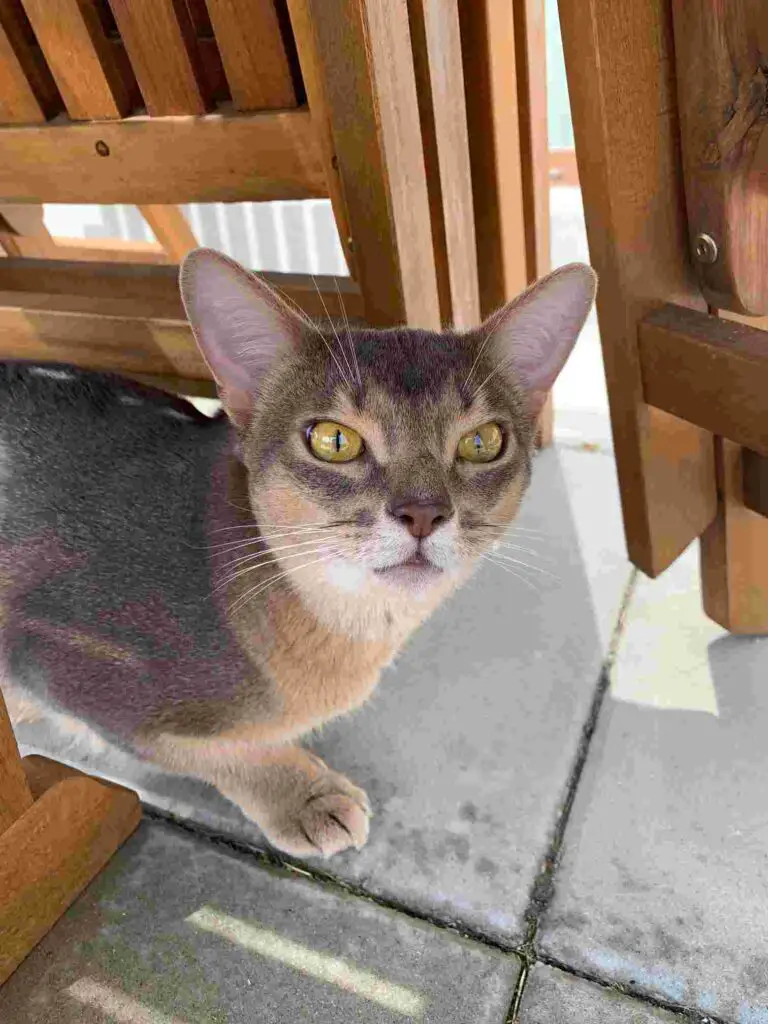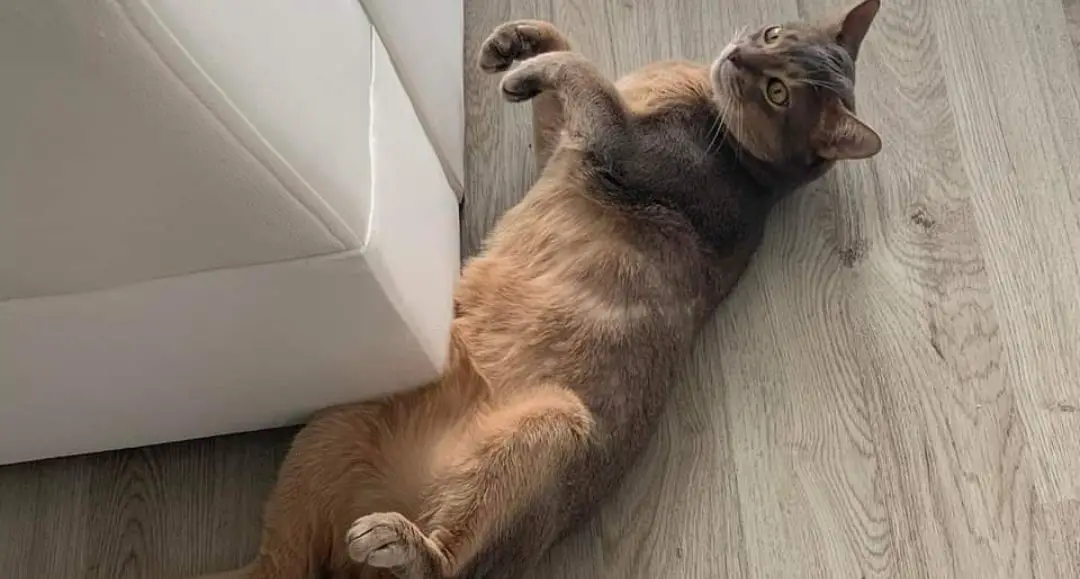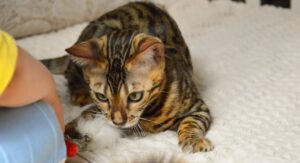Welcome to my insightful blog post on the things that can cause stress in our beloved feline companions.
From my experience living with cats, I can tell you that most cats may seem calm and composed, but just like us, they too can experience stress.
In this article, I will help you explore the common triggers of feline stress and provide valuable tips on how to create a peaceful and stress-free environment for our furry friends.
Let’s get started…
Before we move on to things that cause stress in cats, let’s quickly take a look at identifying stress in cats…
How to Identify Stress in Cats
Identifying stress in cats requires careful observation of their behavior and physical cues.
Look for signs such as excessive grooming, decreased appetite, or changes in litter box habits.
Also, pay attention to any unusual vocalizations, such as excessive meowing or growling.
Additionally, watch for body language like flattened ears, dilated pupils, or a hunched posture.
If you notice these signs, it’s important to create a calm and secure environment for your cat and consult with a veterinarian for further guidance.
Let’s now move on to why you are here…
Things That Cause Stress In Cats

As someone who lived with cats, I can tell you that there are a lot of things that can cause stress in cats.
Some of these things we do without knowing it can cause stress in our cat will be discussed here.
That being said, here are some of the most common causes of stress in cats from my point of view:
Changes in Their Environment
As we all know that cats are known for their love of routine and familiarity, so any sudden changes in their environment can be a major source of stress for them.
This can include moving to a new home, rearranging furniture, or even introducing new objects or smells into their environment.
Most cats thrive on stability, and when their surroundings are altered, it can disrupt their sense of security and trigger stress.
To address this, it’s important to provide your cat with a stable and predictable environment.
If you’re moving to a new home, make sure to gradually introduce your cat to the new space, allowing them to explore at their own pace.
Keep their favorite toys, bedding, and scratching posts in familiar places to provide a sense of comfort.
Additionally, establish a routine for feeding, playtime, and cuddles to give your cat a sense of structure and stability.
Competition for Resources
As you already know that most cats are naturally territorial animals, and competition for resources, such as food, water, litter boxes, and resting spots, can cause significant stress.
This is particularly true in multi-cat households, where cats may feel the need to assert their dominance or defend their territory against other feline companions.
To address this, it’s essential to provide each cat with their own resources to avoid unnecessary competition.
This means having separate food and water bowls, litter boxes, and comfortable resting spots for each cat.
It’s also crucial to ensure that these resources are spread out throughout the home, so no cat feels cornered or threatened while accessing them.
Additionally, make sure to monitor their behavior during meal times and provide enough space to avoid conflicts.
Unfamiliar People or Animals
Most cats are often wary of unfamiliar people or animals, and encounters with strangers can trigger stress and anxiety.
This can be especially true if the cat has not been properly socialized or has had negative experiences in the past.
To address this, it’s important to gradually introduce your cat to new people or animals.
Start by allowing them to observe from a distance and gradually decrease the distance over time.
Provide positive reinforcement, such as treats or praise, when your cat displays calm and relaxed behavior.
Never force interactions or overwhelm your cat, as this can exacerbate their stress.
Instead, let them approach and interact at their own pace, always respecting their boundaries.
Sudden Loud Noises
As an experience cat owner, I can tell you that cats are known for their keen senses, particularly their acute hearing.
While this makes them excellent hunters, it also means that sudden loud noises can cause them a great deal of stress.
Thunderstorms, fireworks, or even loud music can startle and frighten our furry companions.
When cats experience such stress, they may exhibit signs like hiding, dilated pupils, or even urinating outside the litter box.
So, as an experienced cat owner, it’s important to be mindful of potential sources of loud noises and take steps to minimize their impact.
For example, during thunderstorms or fireworks displays, you could create a safe and quiet space for your cat, like a cozy room with some familiar toys and blankets.
Additionally, using white noise machines or playing soothing music may help drown out sudden loud noises and provide a calming environment.
Changes in Their Daily Routine
We all know that cats are creatures of habit, and they thrive on predictability and routine.
Therefore, any significant changes to their daily schedule can disrupt their sense of security, leading to stress and anxiety.
Examples of such changes include moving to a new house, introducing a new family member (human or animal), or altering their feeding or playtime routine.
As an experienced cat owner, it’s crucial to approach these changes with sensitivity and gradually introduce them to your feline friend.
When moving to a new place, for instance, keep your cat confined to a small area initially and slowly expand their territory as they adjust.
Similarly, when introducing a new family member, provide your cat with a safe space where they can retreat to if they feel overwhelmed.
Maintaining consistency in their daily routine, especially when it comes to feeding and playtime, can also help alleviate stress.
Cats appreciate a sense of stability, so try to communicate with them through your actions that they can trust and rely on you.
Veterinary Visits
Veterinary visits are often a significant source of stress for cats. The unfamiliar smells, sights, and sounds of a veterinary clinic can trigger anxiety in our feline companions.
Additionally, the physical examination, vaccinations, or other medical procedures can be uncomfortable or even painful for them.
To minimize stress during veterinary visits, there are a few strategies you can employ.
Firstly, familiarize your cat with their carrier by leaving it out in a comfortable area and occasionally placing treats or toys inside.
This will help them associate the carrier with positive experiences.
Additionally, consider using synthetic feline facial pheromone sprays or wipes in the carrier to create a calming environment.
During the visit, stay calm and reassuring, as your cat will pick up on your energy.
After the visit, offer treats or engage in playtime as a way to reward and distract them from the potentially stressful experience.
Boredom or Lack of Stimulation
Cats are naturally curious and active creatures. When they lack mental and physical stimulation, it can lead to boredom and stress.
This can happen if they don’t have enough toys, playtime, or environmental enrichment.
Cats may become restless, exhibit destructive behavior, or even develop behavioral problems.
To address this, it’s essential to provide your cat with plenty of opportunities for stimulation.
Ensure they have interactive toys, scratching posts, and climbing structures.
Regular play sessions with interactive toys or laser pointers can keep them mentally and physically engaged. Additionally, rotating their toys periodically can help prevent boredom.
Creating a stimulating environment with hiding spots, perches, and windows to observe the outside world can also be beneficial.
Lack of Territory Control
Cats are territorial animals, and any disruption in their territory can cause stress.
This can occur when there are changes in their living environment, such as moving to a new home or introducing new pets.
Cats may feel threatened, anxious, or insecure, leading to stress-related behaviors like hiding, aggression, or inappropriate elimination.
To address this, it’s important to introduce changes gradually and provide a safe space for your cat.
When moving to a new home, set up a cozy area with familiar items like their bed, toys, and scratching post.
Give them time to explore and adjust to the new surroundings at their own pace.
When introducing new pets, do it gradually and under supervision, allowing your cat to have a safe space to retreat to if needed.
Providing vertical spaces like shelves or cat trees can help them feel more secure and in control of their territory.
Travel or Transport
Cats are generally not fans of traveling or being transported. The unfamiliar sights, sounds, and motion can be stressful for them.
Whether it’s a trip to the vet or a longer journey, cats may experience anxiety, fear, or motion sickness.
To address this, it’s important to make travel as comfortable and stress-free as possible.
Start by getting your cat comfortable with their carrier by leaving it open in their environment, placing treats or toys inside, and gradually getting them used to being inside and carried around the house.
Use a carrier that is well-ventilated, secure, and comfortable. Covering the carrier with a blanket can create a sense of security.
Additionally, pheromone sprays or calming treats can help relax your cat during travel.
For longer journeys, consult with your veterinarian for possible medications to alleviate anxiety or motion sickness.
Now you know the things that cause stress in cats, let’s look at things you can do to help your stressed cat…
How to Fix and Manage Stress in Cats

Cats, like humans, can experience stress, and as responsible pet owners, it’s crucial to understand how to fix and manage this issue.
Firstly, creating a calming environment is key. Provide your feline friend with a designated safe space, complete with cozy bedding, toys, and a scratching post.
Additionally, maintaining a consistent routine and offering regular playtime can help alleviate stress.
Consider incorporating interactive toys that stimulate their natural hunting instincts.
Introducing environmental enrichment, such as puzzle feeders or window perches, can also provide mental stimulation and reduce stress.
Furthermore, be mindful of any changes in their surroundings, as cats can be sensitive to alterations in their environment.
I strongly recommend you consider using pheromone diffusers or sprays, as they can create a calming atmosphere.
Finally, if stress persists or worsens, consult with a veterinarian for professional guidance and potential medication options.
Conclusion
In conclusion, understanding the factors that cause stress in cats is crucial for their overall well-being. By addressing these triggers, such as changes in environment, lack of mental stimulation, and inconsistent routines, we can create a harmonious and stress-free environment for our feline friends. Remember, a happy and relaxed cat leads to a happier home for everyone involved.
Here’s an article I wrote about factors that contribute to cat disappearing which stress can also cause.
Questions
Let’s take some common questions:
What are some common triggers for stress in cats?
Cats can become stressed due to changes in their environment, such as moving to a new home or the addition of new pets. Other triggers include loud noises, unfamiliar visitors, and disruptions to their routine.
Can health issues cause stress in cats?
Yes, cats may experience stress as a result of underlying health problems. Conditions like urinary tract infections, dental issues, or digestive disorders can lead to discomfort and anxiety in cats.
How does separation anxiety affect cats?
Cats are known to develop separation anxiety when left alone for long periods. This can cause stress and result in destructive behavior, excessive vocalization, or litter box issues. Providing them with interactive toys and gradually acclimating them to being alone can help alleviate the anxiety.
Are there any signs to look out for to identify stress in cats?
Yes, there are several signs that might indicate stress in cats, including excessive grooming, changes in appetite, hiding, aggression, or excessive vocalization. It’s important to observe their behavior and consult with a veterinarian if any of these signs persist.









